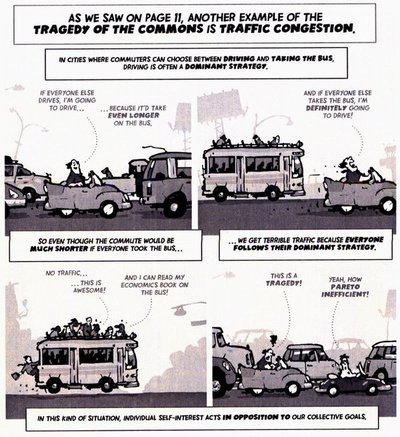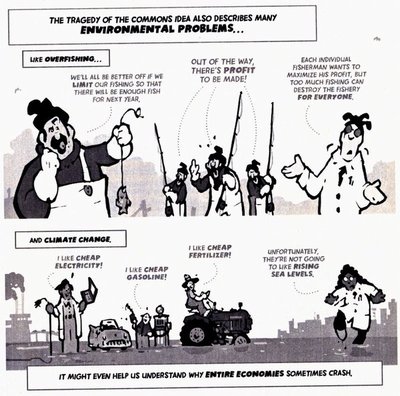April 8, 2010
Prisoners, pirates, pool sharks populate entertaining ‘Cartoon Introduction to Economics’
Microeconomists are wrong about specific things.
Macroeconomists are wrong about things in general.
So says Yoram Bauman, self-proclaimed as the world’s first stand-up economist.
Bauman, a UW alumnus and lecturer on environmental economics with the UW’s Program on the Environment, has garnered national attention twice on the PBS News Hour, most recently during the February segment, “Stand-up Economist finds the light side of a ‘dismal science.'”
“You might be an economist if you adamantly refuse to sell your children because you think they will be worth more later,” the TV camera rolls as he speaks during a recent economics convention in Atlanta.
On YouTube, his spoof of the 10 principles of economics found in a well-known economics textbook has garnered 700,000 hits. That’s not a bad considering the topic is economics but, keeping things in perspective, he says his video trails way behind any site featuring cute puppies. Comments on his YouTube performance include one from “Coolway,” who wrote, “I can’t tell if this is supposed to be funny or educational.”
Well, both, actually.
Bauman, for example, touches on innovative ways to meet environmental challenges during many of his stand-up routines as well as in his first book, The Cartoon Introduction to Economics, out earlier this year.
“Comedy strives to make things as simple as possible,” Bauman says. “You’re always trying to whittle down and make them concise — just like with good teaching.”
Take the “tragedy of the commons,” a pretty unfunny-sounding economic concept.
For natural resources, the “commons” refers to shared resources such as the atmosphere, waterways, forests and fish. An economic theory from the late 1960s says that when individuals, acting independently, follow what’s in their own self-interest then they will go ahead and deplete the shared resource even if that’s not in everyone’s best interest.
In The Cartoon Introduction to Economics, Bauman explains the tragedy of the commons first by looking at traffic congestion, then turns to environmental problems like overfishing and climate change.
“I like cheap electricity,” one cartoon character says. “I like cheap gasoline,” says another. And “cheap fertilizer,” says a third. All are standing ankle-deep in water, along with an economist in lab coat who says, “Unfortunately, they’re not going to like rising sea levels.”
If the price of products made from petroleum doesn’t, somehow, include the cost to the environment — or the commons — there isn’t as much market pressure to curtail their use because they remain “cheap.” As one character in the book says, “If I don’t have to bear the full cost of my actions, of course I’m going to pollute a lot.”
Bauman says, “A lot of people are looking at sustainability. What we’re trying to figure out is when does laissez-faire work and when doesn’t it? When does enlightened self-interest lead to good outcomes?”
One way to get people to pollute less is to make polluting expensive. Bauman says we might consider imposing a carbon tax or creating cap-and-trade systems for emissions — that is, setting a cap on the amount of pollution and providing ways for permit holders to sell or trade emission allowances.
The good thing about pollution taxes or auctioning permits under a cap-and-trade system is that both generate revenue. Bauman’s suggestion is that the revenue be used, in turn, to reduce existing taxes.
It’s all part of a serious message Bauman tries to work into his comedy routines, particularly those on college campuses such as Rutgers, Western Washington University and the University of Kentucky, which are among the places he’s visiting this spring during his combination performance/book tour.
Bauman, who teaches part-time at the UW, Lakeside High School and the Bainbridge Graduate Institute, says he wrote the book as a kind of supplemental textbook as well as for any average reader who wants to learn a bit about economics and enjoy a few jokes along the way. The 200-plus page book covers the basics of microeconomics, such as optimizing individuals, supply and demand and marginal analysis. He and illustrator Grady Klein use prisoners, pirates, pool sharks and a cast of other characters to make their points.
Next up, volume two, on macroeconomics.
“. . .Just as soon as we figure it out ourselves,” a trio of lab-coated economics say on the final page of the book.
(Read an earlier University Week story about Bauman here.)
(Images excerpted from “The Cartoon Introduction to Economics: Volume 1, Microeconomics” by Yoram Bauman and Grady Klein, published in February by Hill and Wang, a division of Farrar, Straus and Giroux, LLC. All rights reserved.)


